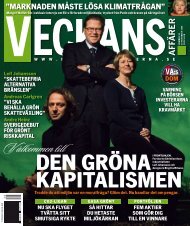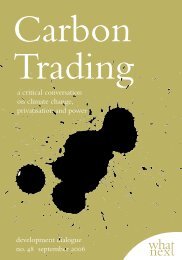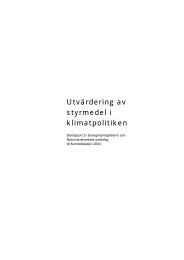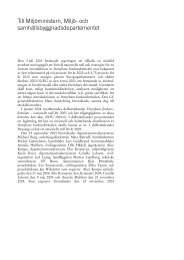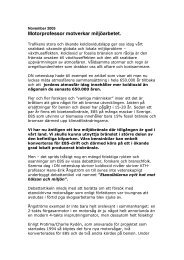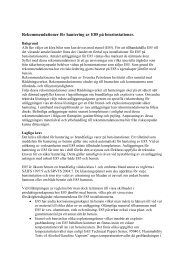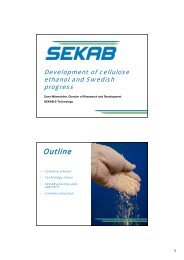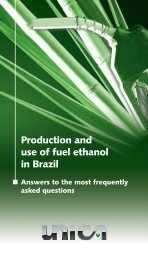Sugarcane ethanol: Contributions to climate change - BAFF
Sugarcane ethanol: Contributions to climate change - BAFF
Sugarcane ethanol: Contributions to climate change - BAFF
Create successful ePaper yourself
Turn your PDF publications into a flip-book with our unique Google optimized e-Paper software.
Introduction <strong>to</strong> sugarcane <strong>ethanol</strong><br />
Hertel, T., W. W.E. Tyner and D.K. Birur, 2008. Biofuels for all? Understanding the Global Impacts of<br />
Multinational. Center for Global Trade Analysis Department of Agricultural Economics, Purdue<br />
University GTAP Working Paper No. 51, 2008.<br />
IEA, 2007. Bioenergy Potential contribution of bioenergy <strong>to</strong> the world’s future energy demand, International<br />
Energy Agency, Paris.<br />
IEA, 2008. Worldwide Trends in Energy Use and E�ciency Key Insights from IEA Indica<strong>to</strong>r Analysis,<br />
Paris, France.<br />
Khanna, M., H. Onal, B. Dhungana and M. Wander, 2007. Economics of Soil Carbon Sequestration �rough<br />
Biomass Crops. Association of Environmental and Resource Economists; Workshop Valuation and<br />
Incentives for Ecosystem Services, June 7-9, 2007.<br />
Kim, S. and B.E. Dale, 2005. Life cycle assessment of various cropping systems utilized for producing biofuels:<br />
Bio<strong>ethanol</strong> and biodiesel. Biomass and Bioenergy 29: 426-439.<br />
Kojima, M. and T. Johnson, 2005. Potential for biofuels for transport in developing countries. ESMAP,<br />
World Bank Copyright �e International Bank for Reconstruction and Development/�e World Bank,<br />
Washing<strong>to</strong>n D.C., USA.<br />
Latner, K., O. Wagner and J. Junyang, 2007. China, Peoples Republic of Bio-Fuels Annual 2007. GAIN Report<br />
Number: CH7039. USDA Foreign Agricultural Service, January 2007.<br />
Macedo, I.C., M.R.L.V. Leal and J.E.A.R. da Silva, 2004. Assessment of Greenhouse Gas Emissions in the<br />
Production and Use of Fuel Ethanol in Brazil. Report <strong>to</strong> the Government of the State of São Paulo, 2004.<br />
Maros, I. and W. Martin, 2008. Implications of Higher Global Food Prices for Poverty in Low-Income<br />
Countries. �e World Bank Development Research Group Trade Team April, Washing<strong>to</strong>n, USA.<br />
OECD, 2008. Economic assessment of biofuel support policies. Paris, France.<br />
OECD/IEA, 2008. Worldwide Trends in Energy Use and E�ciency Key Insights from IEA Indica<strong>to</strong>r Analysis.<br />
Paris, France.<br />
OESO, 2008. Economic assessment of biofuel support policies. Paris, France.<br />
Oxfam, 2008. Inconvenient Truth How biofuel policies are deepening poverty and accelerating <strong>climate</strong><br />
<strong>change</strong> Oxfam Brie�ng Paper, June 2008.<br />
Schuman, G.E., H.H. Janzen and J.E. Herrick, 2002. Soil carbon dynamics and potential carbon sequestration<br />
by rangelands. Environmental Pollution 116: 391-396.<br />
Teixeira Coelho, S., 2005. Biofuels- advantages and trade barriers. UNCTAD/DITC/TED/2005/1.<br />
�e Royal Society, 2008. Sustainable biofuels: prospects and challenges. London, United Kingdom. ISBN<br />
9780854036622.<br />
Von Braun, J., 2006. When Food Makes Fuel: �e Promises and Challenges of Biofuels. Ifpri. Washing<strong>to</strong>n, USA.<br />
<strong>Sugarcane</strong> <strong>ethanol</strong> 27



